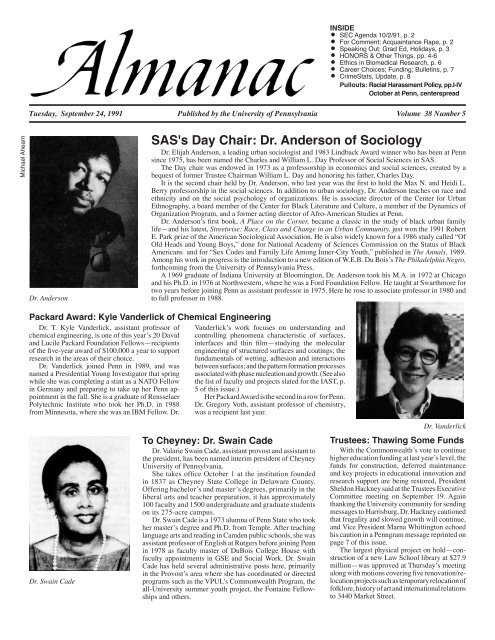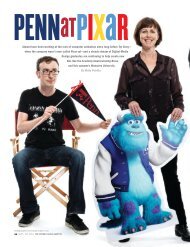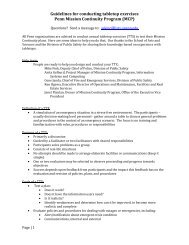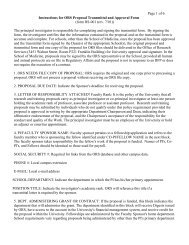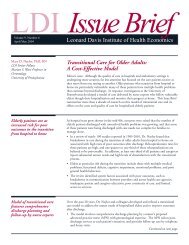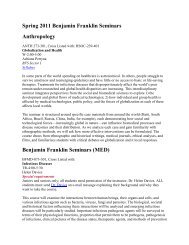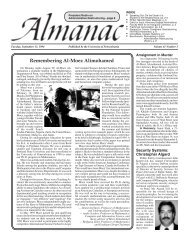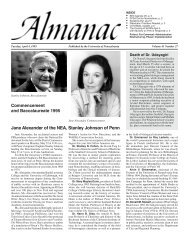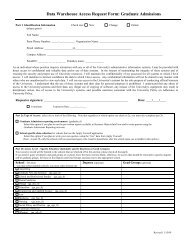No. 5 September 24, 1991 - University of Pennsylvania
No. 5 September 24, 1991 - University of Pennsylvania
No. 5 September 24, 1991 - University of Pennsylvania
You also want an ePaper? Increase the reach of your titles
YUMPU automatically turns print PDFs into web optimized ePapers that Google loves.
INSIDE<br />
SEC Agenda 10/2/91, p. 2<br />
For Comment: Acquaintance Rape, p. 2<br />
Speaking Out: Grad Ed, Holidays, p. 3<br />
HONORS & Other Things, pp. 4-6<br />
Ethics in Biomedical Research, p. 6<br />
•<br />
Career Choices; Funding; Bulletins, p. 7<br />
CrimeStats, Update, p. 8<br />
Pullouts: Racial Harassment Policy, pp.I-IV<br />
October at Penn, centerspread<br />
Tuesday, <strong>September</strong> <strong>24</strong>, <strong>1991</strong> Published by the <strong>University</strong> <strong>of</strong> <strong>Pennsylvania</strong> Volume 38 Number 5<br />
Michael Ahearn<br />
Dr. Anderson<br />
SAS's Day Chair: Dr. Anderson <strong>of</strong> Sociology<br />
Dr. Elijah Anderson, a leading urban sociologist and 1983 Lindback Award winner who has been at Penn<br />
since 1975, has been named the Charles and William L. Day Pr<strong>of</strong>essor <strong>of</strong> Social Sciences in SAS.<br />
The Day chair was endowed in 1973 as a pr<strong>of</strong>essorship in economics and social sciences, created by a<br />
bequest <strong>of</strong> former Trustee Chairman William L. Day and honoring his father, Charles Day.<br />
It is the second chair held by Dr. Anderson, who last year was the first to hold the Max N. and Heidi L.<br />
Berry pr<strong>of</strong>essorship in the social sciences. In addition to urban sociology, Dr. Anderson teaches on race and<br />
ethnicity and on the social psychology <strong>of</strong> organizations. He is associate director <strong>of</strong> the Center for Urban<br />
Ethnography, a board member <strong>of</strong> the Center for Black Literature and Culture, a member <strong>of</strong> the Dynamics <strong>of</strong><br />
Organization Program, and a former acting director <strong>of</strong> Afro-American Studies at Penn.<br />
Dr. Anderson’s first book, A Place on the Corner, became a classic in the study <strong>of</strong> black urban family<br />
life—and his latest, Streetwise: Race, Class and Change in an Urban Community, just won the <strong>1991</strong> Robert<br />
E. Park prize <strong>of</strong> the American Sociological Association. He is also widely known for a 1986 study called “Of<br />
Old Heads and Young Boys,” done for National Academy <strong>of</strong> Sciences Commission on the Status <strong>of</strong> Black<br />
Americans and for “Sex Codes and Family Life Among Inner-City Youth,” published in The Annals, 1989.<br />
Among his work in progress is the introduction to a new edition <strong>of</strong> W.E.B. Du Bois’s The Philadelphia Negro,<br />
forthcoming from the <strong>University</strong> <strong>of</strong> <strong>Pennsylvania</strong> Press.<br />
A 1969 graduate <strong>of</strong> Indiana <strong>University</strong> at Bloomington, Dr. Anderson took his M.A. in 1972 at Chicago<br />
and his Ph.D. in 1976 at <strong>No</strong>rthwestern, where he was a Ford Foundation Fellow. He taught at Swarthmore for<br />
two years before joining Penn as assistant pr<strong>of</strong>essor in 1975. Here he rose to associate pr<strong>of</strong>essor in 1980 and<br />
to full pr<strong>of</strong>essor in 1988.<br />
Packard Award: Kyle Vanderlick <strong>of</strong> Chemical Engineering<br />
Dr. T. Kyle Vanderlick, assistant pr<strong>of</strong>essor <strong>of</strong> Vanderlick’s work focuses on understanding and<br />
chemical engineering, is one <strong>of</strong> this year’s 20 David controlling phenomena characteristic <strong>of</strong> surfaces,<br />
and Lucile Packard Foundation Fellows—recipients interfaces and thin film—studying the molecular<br />
<strong>of</strong> the five-year award <strong>of</strong> $100,000 a year to support engineering <strong>of</strong> structured surfaces and coatings; the<br />
research in the areas <strong>of</strong> their choice.<br />
fundamentals <strong>of</strong> wetting, adhesion and interactions<br />
Dr. Vanderlick joined Penn in 1989, and was between surfaces; and the pattern formation processes<br />
named a Presidential Young Investigator that spring associated with phase nucleation and growth. (See also<br />
while she was completing a stint as a NATO Fellow the list <strong>of</strong> faculty and projects slated for the IAST, p.<br />
in Germany and preparing to take up her Penn appointment<br />
in the fall. She is a graduate <strong>of</strong> Rensselaer Her Packard Award is the second in a row for Penn.<br />
5 <strong>of</strong> this issue.)<br />
Polytechnic Institute who took her Ph.D. in 1988 Dr. Gregory Voth, assistant pr<strong>of</strong>essor <strong>of</strong> chemistry,<br />
from Minnesota, where she was an IBM Fellow. Dr. was a recipient last year.<br />
Dr. Swain Cade<br />
To Cheyney: Dr. Swain Cade<br />
Dr. Valarie Swain Cade, assistant provost and assistant to<br />
the president, has been named interim president <strong>of</strong> Cheyney<br />
<strong>University</strong> <strong>of</strong> <strong>Pennsylvania</strong>.<br />
She takes <strong>of</strong>fice October 1 at the institution founded<br />
in 1837 as Cheyney State College in Delaware County.<br />
Offering bachelor’s and master’s degrees, primarily in the<br />
liberal arts and teacher preparation, it has approximately<br />
100 faculty and 1500 undergraduate and graduate students<br />
on its 275-acre campus.<br />
Dr. Swain Cade is a 1973 alumna <strong>of</strong> Penn State who took<br />
her master’s degree and Ph.D. from Temple. After teaching<br />
language arts and reading in Camden public schools, she was<br />
assistant pr<strong>of</strong>essor <strong>of</strong> English at Rutgers before joining Penn<br />
in 1978 as faculty master <strong>of</strong> DuBois College House with<br />
faculty appointments in GSE and Social Work. Dr. Swain<br />
Cade has held several administrative posts here, primarily<br />
in the Provost’s area where she has coordinated or directed<br />
programs such as the VPUL’s Commonwealth Program, the<br />
all-<strong>University</strong> summer youth project, the Fontaine Fellowships<br />
and others.<br />
Dr. Vanderlick<br />
Trustees: Thawing Some Funds<br />
With the Commonwealth’s vote to continue<br />
higher education funding at last year’s level, the<br />
funds for construction, deferred maintenance<br />
and key projects in educational innovation and<br />
research support are being restored, President<br />
Sheldon Hackney said at the Trustees Executive<br />
Committee meeting on <strong>September</strong> 19. Again<br />
thanking the <strong>University</strong> community for sending<br />
messages to Harrisburg, Dr. Hackney cautioned<br />
that frugality and slowed growth will continue,<br />
and Vice President Marna Whittington echoed<br />
his caution in a Penngram message reprinted on<br />
page 7 <strong>of</strong> this issue.<br />
The largest physical project on hold—construction<br />
<strong>of</strong> a new Law School library at $27.9<br />
million—was approved at Thursday’s meeting<br />
along with motions covering five renovation/relocation<br />
projects such as temporary relocation <strong>of</strong><br />
folklore, history <strong>of</strong> art and international relations<br />
to 3440 Market Street.
SENATE<br />
From the Senate Office<br />
The following agenda is published in accordance with the Senate Rules.<br />
Agenda <strong>of</strong> Senate Executive Committee Meeting<br />
Wednesday, October 2, <strong>1991</strong>, 3-5:30 p.m.<br />
1. Approval <strong>of</strong> the minutes <strong>of</strong> <strong>September</strong> 11, <strong>1991</strong><br />
2. Chair’s Report<br />
3. <strong>No</strong>minations to Senate <strong>No</strong>minating Committee<br />
4. Discussion with Provost Aiken <strong>of</strong> the Academic Planning and Budget<br />
Committee’s agenda for <strong>1991</strong>-92, including faculty salaries<br />
5. Procedure <strong>of</strong> consultative committees<br />
6. AAUP letter regarding misconduct procedures<br />
7. Discussion <strong>of</strong> faculty appointment to the Affirmative Action Council<br />
8. Other new business<br />
9. Adjournment by 5:30 p.m.<br />
Questions can be directed to Carolyn Burdon, Executive Assistant to the<br />
Chair <strong>of</strong> the Faculty Senate, Ext. 8-6943.<br />
OF RECORD<br />
The following is a reiteration by the President <strong>of</strong> a policy<br />
published May 7, <strong>1991</strong>.<br />
Eleemosynary Policy<br />
The <strong>University</strong> has had a policy since at least 1986 <strong>of</strong> not making<br />
charitable contributions from <strong>University</strong> funds to other eleemosynary<br />
organizations (i.e., any organization supported by charitable giving regardless<br />
<strong>of</strong> tax-exempt status), unless a written waiver is granted by the<br />
President. Because Penn solicits gifts for educational and research purposes<br />
<strong>of</strong> the <strong>University</strong>, it is inappropriate to transfer those funds to other uses<br />
or organizations, no matter how worthy. In light <strong>of</strong> the current budgetary<br />
situation, I wish to reaffirm this policy: payments by the <strong>University</strong> to<br />
other eleemosynary organizations in the form <strong>of</strong> a gift or contribution are<br />
prohibited unless approved in writing by the President. Effective July 1,<br />
<strong>1991</strong>, I will no longer grant such waivers.<br />
—Sheldon Hackney<br />
FOR COMMENT<br />
To the <strong>University</strong> Community:<br />
As part <strong>of</strong> our ongoing efforts to foster ethical and equitable academic and employment environments,<br />
we are pleased to re-publish for comment, this proposed Acquaintance Rape and Sexual Violence Policy<br />
first published in Almanac July 16, <strong>1991</strong>. The new policy will be an important addition to existing<br />
policies including the Sexual Harassment, Racial Harassment and General Conduct policies.<br />
Please review the Policy and send comments and recommendations by October 2, <strong>1991</strong>,<br />
to me at 200 Houston Hall/6306. —Kim Morrisson, Vice Provost for <strong>University</strong> Life<br />
Acquaintance Rape and Sexual Violence Policy<br />
Introduction<br />
The <strong>University</strong> <strong>of</strong> <strong>Pennsylvania</strong> seeks a safe and healthy environment<br />
for all community members and visitors. Thus, Penn has developed the<br />
following policy on acquaintance rape/sexual violence to set forth definitions,<br />
to reaffirm Penn’s commitment to providing resources and processes<br />
for prevention, education, support, reporting, adjudication, protection from<br />
retaliation, and to identify the range <strong>of</strong> sanctions. The <strong>University</strong> will also<br />
provide multiple access points for collection <strong>of</strong> information about incidents<br />
and a clear process for dissemination <strong>of</strong> acquaintance rape/sexual violence<br />
statistics to the community.<br />
The <strong>University</strong> needs a specific policy on rape and sexual violence<br />
because the prevalence <strong>of</strong> rape and sexual violence on college campuses<br />
is alarming.<br />
Statistics compel universities throughout the country to acknowledge<br />
that significant numbers <strong>of</strong> their members have been raped or will be<br />
raped. 1 Given Penn’s history <strong>of</strong> providing national leadership with respect<br />
to rape and sexual assault education and counseling, it is timely for Penn to<br />
continue this role by adopting a specific policy on acquaintance rape and<br />
sexual violence. The personal trauma experienced by the victims/survivors<br />
and the nature and consequences <strong>of</strong> this crime undermine the trust essential<br />
to the process <strong>of</strong> education and the mission <strong>of</strong> the <strong>University</strong>. This crime<br />
also conflicts with our very basic standards <strong>of</strong> behavior. Indeed, this form<br />
<strong>of</strong> sexual violence is particularly damaging to our community because<br />
victims/survivors <strong>of</strong>ten are acquainted with and must continue to interact<br />
with their assailants. Moreover, for many men and women it is difficult<br />
to define this behavior as rape.<br />
1<br />
In a study <strong>of</strong> 32 colleges and universities, one in four college women reported<br />
being a victim <strong>of</strong> rape or attempted rape during the preceding year.<br />
Eighty-four percent <strong>of</strong> these victims/survivors were acquainted with their<br />
assailants.<br />
—The National Institute <strong>of</strong> Mental Health (NIMH),<br />
“Ms.”, Project on Sexual Assault, 1987.<br />
Definition<br />
Acquaintance rape is a form <strong>of</strong> sexual violence. For the purpose <strong>of</strong><br />
this policy, acquaintance rape/sexual violence is defined as any act in<br />
which a member <strong>of</strong> the university community forces another with whom<br />
he or she is acquainted to engage in sexual activity against her or his<br />
will or without her or his consent. Assent shall not constitute consent<br />
if it is given by a person who because <strong>of</strong> youth, mental disability or<br />
intoxication is unable to make a reasonable judgment concerning the<br />
nature <strong>of</strong> or harmfulness <strong>of</strong> the activity. This policy applies to groups<br />
as well as individuals.<br />
Intervention<br />
The <strong>University</strong> <strong>of</strong> <strong>Pennsylvania</strong> will provide resources to support<br />
victims/survivors, will utilize <strong>University</strong> fact-finding and disciplinary<br />
procedures with appropriate jurisdiction, will publish annual statistics<br />
on incidents <strong>of</strong> acquaintance rape and other forms <strong>of</strong> sexual violence,<br />
and will provide comprehensive education for the prevention <strong>of</strong> sexual<br />
violence including acquaintance rape at the <strong>University</strong> <strong>of</strong> <strong>Pennsylvania</strong>.<br />
Incidents reported to the appropriate departments will be addressed<br />
promptly and will be treated confidentially. In addition, the <strong>University</strong><br />
will, as appropriate, inform members <strong>of</strong> the Penn community when an<br />
incident has been so reported. The procedures which implement this<br />
policy will take into account the need to investigate charges which may<br />
be filed and the right to confidentiality <strong>of</strong> all involved parties. When<br />
appropriate, after an incident occurs, outreach and support to faculty,<br />
students and staff affected by the particular incident will be part <strong>of</strong><br />
Penn’s response. This support may include release time, leaves, or<br />
other accommodations.<br />
Sanctions<br />
<strong>University</strong> sanctions will be imposed in accordance with appropriate<br />
<strong>University</strong> processes upon persons found to have violated this policy.<br />
These sanctions can include but are not limited to suspension, expulsion,<br />
and/or separation from the <strong>University</strong>. In addition, an individual charged<br />
may be subject to prosecution by the Office <strong>of</strong> the District Attorney under<br />
<strong>Pennsylvania</strong> Criminal Statutes.<br />
ALMANAC <strong>September</strong> <strong>24</strong>, <strong>1991</strong>
On Forming Acquaintance Rape Policy<br />
Across the United States, campus-wide policy on acquaintance rape and<br />
sexual violence is needed now more than ever. As acquaintance rape grows<br />
to be the issue <strong>of</strong> the Nineties, colleges and universities are being relied<br />
upon by students, their parents and faculty to develop a comprehensive<br />
and proactive approach to addressing this salient issue. In order for our<br />
campuses to provide the safety that is expected, promised, and deserved,<br />
we must have sensitive and effective systems for safe reporting, support<br />
for victims/survivors, and adjudication <strong>of</strong> perpetrators. Most important,<br />
these systems need to be reflected in institutional policy and supported by<br />
well-coordinated procedures and adequate resources.<br />
The almost two-decade history <strong>of</strong> Penn’s response to rape, creating<br />
a safer campus and providing support to victim/survivors, sets the stage<br />
for the next step in realizing the <strong>University</strong>’s commitment to stop sexual<br />
violence. Penn’s proposed Policy on Acquaintance Rape and Sexual Violence<br />
emerged from the collaborative efforts <strong>of</strong> concerned faculty, staff and<br />
the leadership <strong>of</strong> a student-initiated and student-managed peer education<br />
group, Students Together Against Acquaintance Rape (STAAR). STAAR<br />
has been nationally recognized as a model program for the prevention <strong>of</strong><br />
acquaintance rape.<br />
The campus-wide Acquaintance Rape Working Group, mandated by<br />
President Hackney to oversee Penn’s response to acquaintance rape, is<br />
comprised <strong>of</strong> students, faculty and staff from all areas <strong>of</strong> the <strong>University</strong>.<br />
Its most notable accomplishment was the drafting <strong>of</strong> an acquaintance rape<br />
policy and procedures for its implementation.<br />
Faculty, staff and student members <strong>of</strong> the Acquaintance Rape Working<br />
Group will be presenting Penn’s comprehensive approach at two upcoming<br />
national conferences:<br />
— 1st International Conference: Sexual Assault on Campus, October 3-5,<br />
<strong>1991</strong>, Orlando, Fla.<br />
— Sixth National Conference on Campus Violence, February 6-8, 1992,<br />
Baltimore, Md.<br />
For information, or to schedule a workshop or classroom presentation, call<br />
STAAR at the <strong>of</strong>fice <strong>of</strong> Student Health Services, 662-7126.<br />
—Susan Villari, Health Educator<br />
Confidential Counseling on Rape<br />
The Penn Women’s Center <strong>of</strong>fers free confidential counseling to all<br />
members <strong>of</strong> the Penn community. If you or someone you know needs assistance<br />
regarding rape, including acquaintance rape or other sexual assault,<br />
or if you need counseling on other such personal issues, please call Alyce<br />
Jackson, Ph.D., or Robin Lynk, M.S., at 898-8611.<br />
—Penn Women’s Center<br />
On Graduate Studies<br />
The short article on page 9 <strong>of</strong> your May<br />
28th issue, is, so far as I know, the first<br />
public announcement at Penn concerning<br />
the new Mellon funding project for graduate<br />
studies. As a student in the English<br />
department and a recipient <strong>of</strong> funds from<br />
this program, I feel it important to comment<br />
on one important issue raised in that<br />
announcement.<br />
Your article declares the purpose <strong>of</strong> this<br />
program to be to “support improvements<br />
in the structure and organization <strong>of</strong> Ph.D.<br />
programs in the humanities,” which the<br />
Mellon Foundation says will be achieved<br />
by “lower[ing] the average time <strong>of</strong><br />
completion from the present eight years to<br />
five.” But in fact, there is much anecdotal<br />
evidence to support the contention that<br />
less time would not be conducive to future<br />
academic and pr<strong>of</strong>essional success.<br />
Dean Fitts, in your article, refers to a<br />
two-year study performed by the Mellon<br />
Foundation which is supposed to verify<br />
the program’s assumptions; yet that study,<br />
in my understanding, ignores crucial variables<br />
in the career <strong>of</strong> academics. It fails<br />
to correlate pr<strong>of</strong>essional success (tenure,<br />
publications, salary, teaching evaluations,<br />
committee appointments) with length <strong>of</strong><br />
time <strong>of</strong> graduate study, and specifically<br />
fails to demonstrate that brief school<br />
careers promote such success, or that long<br />
careers hamper it.<br />
Such a lack seems glaring because<br />
many <strong>of</strong> our most successful pr<strong>of</strong>essors,<br />
chairpersons, and even deans took<br />
much more than the “target time” <strong>of</strong><br />
five years to complete their studies.<br />
Indeed, a brief study <strong>of</strong> hiring in my<br />
department reveals that even our own<br />
recent faculty appointments, at both<br />
the junior and senior levels, have not<br />
tended to favor persons who completed<br />
their studies in a short period <strong>of</strong> time.<br />
Furthermore, it is clear that many <strong>of</strong> the<br />
most successful pr<strong>of</strong>essors in our department<br />
do not favor such a strong push<br />
toward a uniform five-year degree.<br />
Speaking Out<br />
Indeed, by favoring students with<br />
projects whose central virtue is their<br />
manageability, the grant threatens ideals <strong>of</strong><br />
thoroughness and intellectual responsibility<br />
on which the academy is built. It threatens<br />
to flood the market with candidates<br />
whose intellectual identities, to say nothing<br />
<strong>of</strong> their academic projects, have not met<br />
the tests <strong>of</strong> maturity which ensure depth<br />
<strong>of</strong> understanding and clarity <strong>of</strong> method. In<br />
sum, by concentrating almost solely on the<br />
financial aspects <strong>of</strong> graduate education, the<br />
Mellon grant augurs badly for the future <strong>of</strong><br />
graduate study in our universities.<br />
—David Golumbia<br />
Graduate Student, English<br />
More on Holiday Policy<br />
I feel obliged to respond to the<br />
Provost’s reply to my letter regarding<br />
religious holidays as the Provost completely<br />
misconstrued the intent <strong>of</strong> my<br />
remarks. I was not complaining about<br />
the lack <strong>of</strong> extensive consultation on<br />
his part; on the contrary there has been<br />
too much consultation on a matter that<br />
should only concern the faculty: at what<br />
times we should give exams and how we<br />
should handle make-ups, etc. As far as<br />
I know, we are still a non-religious university.<br />
Therefore, I do not believe that<br />
we have any obligation to treat absences<br />
due to religious beliefs any differently<br />
than other absences. To accommodate<br />
students for such reasons is a courtesy<br />
that most <strong>of</strong> the faculty extends to the<br />
students. It is not an obligation, and if<br />
the administration wants to treat it that<br />
way, this is indeed an infringement on<br />
the prerogative <strong>of</strong> the faculty members<br />
to handle their classes as they judge<br />
best. Let me remind the Provost that I<br />
have spent many years at this university<br />
when there was no memorandum on the<br />
subject and these problems were handled<br />
individually with no complaints. I<br />
strongly urge a return to this system. The<br />
present memorandum is divisive; it is<br />
impossible to accommodate all factions,<br />
and, in fact, the memorandum disregards<br />
very large constituencies. The question<br />
<strong>of</strong> how many holidays we should have<br />
is also one that should be decided by<br />
the faculty. Over the years, we have cut<br />
the normal four years <strong>of</strong> college by six<br />
months. In addition to having to deal<br />
with shortened semesters, are we to be<br />
expected to accommodate all religious<br />
beliefs? Are we here to educate and<br />
stimulate students or are we here to serve<br />
their religious needs? I would like to<br />
know from the Provost and the President<br />
what they consider our mission to be.<br />
I find comparison <strong>of</strong> complaints<br />
about parking with those about religious<br />
holidays very inappropriate. Parking is a<br />
service <strong>of</strong>fered by the university, and we<br />
all pay plenty for it. Therefore, we are<br />
entitled to complain, although not to the<br />
Provost but to the Parking Director. The<br />
only service the faculty should <strong>of</strong>fer is to<br />
educate students to the very best <strong>of</strong> their<br />
ability. Policy on religious holidays is a<br />
courtesy—not a service—<strong>of</strong>fered by the<br />
faculty, and complaints should not come<br />
to the Provost either. I believe the Provost<br />
has enough important problems without<br />
trying to solve those which are properly<br />
the responsibility <strong>of</strong> the faculty.<br />
—Madeleine M. Joullie,<br />
Pr<strong>of</strong>essor <strong>of</strong> Chemistry<br />
The Provost Responds:<br />
I do not wish to become involved in<br />
a protracted argument over the issue <strong>of</strong><br />
the Academic Calendar and our policy<br />
on religious and secular holidays as it is<br />
my understanding that the Faculty Senate<br />
will be reviewing these matters. I would<br />
note, however, that my files on religious<br />
holidays go back at least to 1964, that<br />
the <strong>University</strong> has continuously had a<br />
somewhat similar policy since that year,<br />
and that there were Provost’s memoranda<br />
issued about it (the first one in my file is<br />
from David Goddard and is dated <strong>No</strong>vember<br />
5, 1964).<br />
—Michael Aiken<br />
ALMANAC <strong>September</strong> <strong>24</strong>, <strong>1991</strong>
DEATHS<br />
Dr. Otto Springer, 1905-91<br />
Dr. Otto Springer, Dean <strong>of</strong> the College <strong>of</strong> Arts<br />
and Sciences from 1959-68 and Vice-Provost <strong>of</strong><br />
the <strong>University</strong> from 1963-68, died <strong>September</strong> 15<br />
in Bryn Mawr at the age <strong>of</strong> 86.<br />
Born in Aalen, Germany, Dr. Springer<br />
studied at the Protestant theological seminaries<br />
<strong>of</strong> Malbrown and Blaubeuran, Germany,<br />
then attended the Universities <strong>of</strong> Berlin,<br />
Munich and Tubingen, taking his Ph.D. at<br />
Tubingen in 1927. He emigrated to the United<br />
States in 1930, teaching and heading the<br />
German departments at Wheaton College in<br />
Massachusetts and at the <strong>University</strong> <strong>of</strong> Kansas.<br />
He joined Penn in 1940 as a pr<strong>of</strong>essor <strong>of</strong><br />
Germanic Languages. A naturalized citizen<br />
<strong>of</strong> the U.S., in 1945 he was commissioned<br />
a temporary lieutenant colonel in the U.S.<br />
Army for a special mission to locate and<br />
restore to their owners art treasures hidden<br />
by the Germans in Europe.<br />
At Penn, Dr. Springer chaired the department<br />
<strong>of</strong> Germanic Languages from 1946 to 1957, and<br />
held several visiting pr<strong>of</strong>essorships at Princeton,<br />
Salzburg and other universities. Along with other<br />
scholarly memberships he was a Fellow <strong>of</strong> the<br />
Medieval Academy <strong>of</strong> America and an honorary<br />
member <strong>of</strong> Phi Beta Kappa. A prolific author<br />
<strong>of</strong> articles and papers—some <strong>of</strong> them collected<br />
in a retrospective published in the mid-seventies—Dr.<br />
Springer was especially known for<br />
his dictionaries. He was editor-in-chief <strong>of</strong> the<br />
standard work in German, the four-volume<br />
Langenscheidt’s Encyclopedic Dictionary <strong>of</strong><br />
English-German and its sister edition in German-English.<br />
On leaving the deanship in 1968, Dr. Springer<br />
was named <strong>University</strong> Pr<strong>of</strong>essor <strong>of</strong> Germanic<br />
Languages. He was called back to administration,<br />
in 1970 as acting director <strong>of</strong> libraries and<br />
again a few years later as chair <strong>of</strong> a committee to<br />
harmonize academic regulations <strong>of</strong> the College<br />
and College for Women during the merger that<br />
produced SAS.<br />
After taking emeritus status in 1975, he was<br />
honored by his colleagues and former students<br />
with a Festschrift. Until a few days ago he had<br />
continued to work with Dr. Albert Lloyd on an<br />
etymological dictionary <strong>of</strong> Old High German; the<br />
first <strong>of</strong> a projected eight volumes was issued in<br />
1988 and the second volume is in progress. As a<br />
hobby, Dr. Springer had also written a grammar<br />
<strong>of</strong> Old Icelandic.<br />
Dr. Springer is survived by his widow, Herta;<br />
two sons, Wolf Ernest and John Ulrich; a daughter,<br />
Lauren Barbara; and a brother, Julius.<br />
Dr. Juris Saulitis, researcher in the Chemistry<br />
department, died <strong>September</strong> 10 at the<br />
age <strong>of</strong> 33. Dr. Saulitis had come to the U.S. in<br />
August from his native Latvia, where he had<br />
taken his undergraduate degree at the Latvian<br />
State <strong>University</strong> and his Ph.D. at the Institute <strong>of</strong><br />
Organic Synthesis. At Penn he was working on<br />
the development <strong>of</strong> a method for understanding<br />
the structure <strong>of</strong> proteins.<br />
He is survived by his wife, Erica, and daughter,<br />
Anda, both <strong>of</strong> Riga.<br />
Dr. Schuyler V. R. Cammann, pr<strong>of</strong>essor<br />
emeritus <strong>of</strong> Oriental Studies, died <strong>September</strong><br />
10 at the age <strong>of</strong> 79. Dr. Camman, who received<br />
his B.A. at Yale, M.A. at Harvard and Ph.D. at<br />
Johns Hopkins, joined the <strong>University</strong> faculty in<br />
1949, becoming a full pr<strong>of</strong>essor in 1966. He was<br />
made emeritus pr<strong>of</strong>essor in 1982.<br />
He is survived by his wife, Mary, <strong>of</strong> Philadelphia.<br />
HONORS &…Other<br />
Portraits<br />
Unveiled this summer at the School <strong>of</strong> Nursing<br />
was the J. Nelson Shanks portrait <strong>of</strong> Dean<br />
Claire Fagin, who announced last year her plan<br />
to step down and take up her term as president<br />
<strong>of</strong> the National League <strong>of</strong> Nursing. As the third<br />
dean <strong>of</strong> the School, she is credited not only with<br />
expanding but also reshaping nursing education<br />
and research at Penn.<br />
Coming Thursday, <strong>September</strong> 26 is the<br />
unveiling <strong>of</strong> a portrait <strong>of</strong> Dr. Robert E. Davies,<br />
Benjamin Franklin Pr<strong>of</strong>essor and <strong>University</strong><br />
Pr<strong>of</strong>essor <strong>of</strong> Molecular Biology. Mary Whyte’s<br />
portrait <strong>of</strong> the recent past chair <strong>of</strong> the Faculty<br />
Senate will be presented by colleagues at a 5<br />
p.m. reception in the Rare Books Room <strong>of</strong> Van<br />
Pelt Library; friends are welcome.<br />
Awards<br />
The <strong>1991</strong> Steele Prize <strong>of</strong> the American<br />
Mathematical Society has been given to Dr.<br />
Eugenio Calabi, the Thomas F. Scott Pr<strong>of</strong>essor<br />
<strong>of</strong> Mathematics, for his fundamental work on<br />
global differential geometry—work that has<br />
“pr<strong>of</strong>oundly changed the landscape <strong>of</strong> the field,”<br />
according to the Society. “His pioneering work<br />
in the complex <strong>of</strong> Monge-Ampere equation<br />
and Kahler Einstein metrics, followed by later<br />
work <strong>of</strong> Aubin and Yau, led to the resolution <strong>of</strong><br />
a number <strong>of</strong> problems in algebraic geometry<br />
beyond the reach <strong>of</strong> other methods.”<br />
Dr. Martin Seligman, pr<strong>of</strong>essor <strong>of</strong> psychology<br />
and director <strong>of</strong> clinical training, received<br />
the <strong>1991</strong> William James Fellow Award <strong>of</strong><br />
the American Psychological Society, given<br />
for internationally recognized outstanding<br />
scientific contribution.<br />
The Philadelphia area “Transportation Engineer<br />
<strong>of</strong> the Year” for 1990-91 is Dr. Vukan<br />
R. Vuchic, the UPS Foundation Pr<strong>of</strong>essor <strong>of</strong><br />
Transportation at SEAS. He was singled out by<br />
the Philadelphia Section <strong>of</strong> the American Society<br />
<strong>of</strong> Civil Engineers for significant contributions<br />
to civil engineering.<br />
Boardman Lecture: CA 100th<br />
The Christian Association’s 100th anniversary<br />
celebration continues Wednesday,<br />
October 2, with a centennial lecture<br />
at 4:30 p.m. in the CA auditorium at 36th<br />
and Locust Walk.<br />
The George Dana Boardman Lecturer<br />
will be Dr. Rosemary Ruether, pr<strong>of</strong>essor<br />
<strong>of</strong> religious studies at the Garrett Evangelical<br />
Theological Seminary. Her topic is<br />
“Liberating the Future: A Cross-Cultural<br />
Feminist Perspective.” The Rev. Mr. Richard<br />
R. Fernandez, executive director <strong>of</strong><br />
the <strong>No</strong>rtheast Interface Movement and a<br />
former CA acting director, will discuss the<br />
Christian Association and the <strong>University</strong>,<br />
and Dr. Ann Matter <strong>of</strong> Religious Thought<br />
will give a history <strong>of</strong> the Boardman Lecture<br />
tradition. Provost Michael Aiken, the<br />
Rev. Dr. Beverly Dale, and organist Kevin<br />
Chun will participate. All members <strong>of</strong> the<br />
<strong>University</strong> are invited.<br />
Dean Fagin, by Shanks<br />
The worldwide Lucy Wharton Drexel<br />
Medal <strong>of</strong> the <strong>University</strong> Museum was awarded<br />
in May to Dr. William R. Coe, curator emeritus<br />
<strong>of</strong> the American Section and research director<br />
<strong>of</strong> the Museum’s Tikal Project. He is the 23rd<br />
recipient <strong>of</strong> the award, established in 1889<br />
and given for achievement in excavation or<br />
publication. Its earlier recipients include the<br />
Chinese archaeologist Kwang-Chich Chang,<br />
Gordon Randolph Willey for Mayan research,<br />
Sir Leonard Woolley for Near Eastern archae-<br />
(HONORS continue past inserts)<br />
It Started in College Hall: On December 27, 1891, in 200 C<br />
organizational meeting <strong>of</strong> the American Psychological Assoc<br />
right) came to College Hall to unveil a plaque that will mark<br />
man, pr<strong>of</strong>essor emeritus; Dr. Florence Denmark, an alumna<br />
Stevens, a historian <strong>of</strong> science; Dr. John Sabini, pr<strong>of</strong>essor <strong>of</strong><br />
ALMANAC <strong>September</strong> <strong>24</strong>, <strong>1991</strong>
Things<br />
ology and Sir Richard Mortimer Wheeler for<br />
work in Europe and India.<br />
The Museum as a whole was honored in<br />
Guatemala this summer, in a special ceremony<br />
at the ancient Maya ruins at Tikal. Dr. Coe’s<br />
six-volume study <strong>of</strong> the landmark excavation<br />
in the jungle between 1956 and 1970 was one<br />
<strong>of</strong> the achievements celebrated. Nine mayors <strong>of</strong><br />
the region’s municipalities, along with scores<br />
<strong>of</strong> school children whose donations helped pay<br />
for the celebration, came to welcome Museum<br />
Director Dr. Robert H.Dyson, the Tikal Project<br />
epigrapher Dr. Christopher Jones and Research<br />
Associates Rudi Larios, Miguel Orrego, and<br />
David Sedat. A brass plaque was unveiled,<br />
bearing the names <strong>of</strong> over 200 investigators<br />
from the U.S., Guatemala and other countries.<br />
Among others cited were figures who originated<br />
and found backing for the massive project, Drs.<br />
Froelich Rainey, Edwin Shook, John Dimick,<br />
Percy Madeira and Samuel B. Eckert.<br />
Honorary Degrees<br />
The Ohio State <strong>University</strong> conferred the<br />
honorary degree Doctor <strong>of</strong> Humane Letters<br />
this summer on President Emeritus Martin<br />
Meyerson, citing him as scholar, author, eduator,<br />
administrator, diplomat and public servant. “His<br />
contributions to our understanding <strong>of</strong> the urban<br />
condition are unequaled," the citation said. “He<br />
continues to foster the international exchange <strong>of</strong><br />
ideas, sharing the knowledge gleaned through his<br />
vast experience with the global community.”<br />
Dr. Edward B. Shils, the George W. Taylor<br />
Pr<strong>of</strong>essor <strong>of</strong> Entrepreneurial Studies at the<br />
Wharton School, received the Honorary Doctorate<br />
<strong>of</strong> Philosophy from Tel Aviv last year, and<br />
delivered the opening lecture inaugurating the<br />
David and Anne Warsaw Entrepreneurial Center<br />
in Jerusalem.<br />
ollege Hall Dr. William James called to order the first<br />
iation. This month, the APA’s Dr. John Popplestone (far<br />
the spot. At the ceremony, left to right: Dr. Henry Gleitand<br />
past head <strong>of</strong> the APA; SAS’s new dean, Dr. Rosemary<br />
psychology; and Dr. Popplestone.<br />
Photo by Michael Waxman<br />
To Federal Role<br />
Dr. Joseph Bordogna, former SEAS dean<br />
who is now the Albert Fitler Moore Pr<strong>of</strong>essor<br />
<strong>of</strong> Engineering, has been named head <strong>of</strong> the<br />
Engineering Directorate <strong>of</strong> the National Science<br />
Foundation. In this role he will oversee<br />
the engineering portfolio <strong>of</strong> NSF-sponsored<br />
research, including the Foundation’s interdisciplinary<br />
research centers, and will be responsible<br />
for integrating the Directorate’s education and<br />
research programs.<br />
President George Bush has appointed Dr.<br />
Dennis Yao, associate pr<strong>of</strong>essor <strong>of</strong> public policy<br />
and management at Wharton, to the five-member<br />
Federal Trade Commission.<br />
The Law School’s Emeritus Pr<strong>of</strong>essor<br />
Martin J. Aronstein and Pr<strong>of</strong>essor Charles W.<br />
Mooney, Jr., are two <strong>of</strong> the 12 members named<br />
to the Securities and Exchange Commission’s<br />
new Market Transactions Advisory Committee,<br />
which will advise on the exercise <strong>of</strong> newly<br />
delegated S.E.C. power, under the Market<br />
Reform Act <strong>of</strong> 1990, to issue preemptive<br />
federal regulations concering the transfer and<br />
pledge <strong>of</strong> securities on findings <strong>of</strong> necessity.<br />
These matters have been governed by state<br />
law, principally by Article 8 <strong>of</strong> the Uniform<br />
Commercial Code. For revision <strong>of</strong> that code<br />
in the light <strong>of</strong> the 1990 reform act, Pr<strong>of</strong>essor<br />
Curtis R. Reitz, the Algernon Sydney Biddle<br />
Pr<strong>of</strong>essor <strong>of</strong> Law and former Provost, has been<br />
named to chair the drafting committee <strong>of</strong> the<br />
National Conference <strong>of</strong> Commissioners on<br />
Uniform State Laws.<br />
IAST: Faculty and Projects<br />
In a press packet issued last week by the Office <strong>of</strong> News and Public Affairs, the Institute for<br />
Advanced Science and Technology’s purpose was described as providing “many distinguished<br />
scientists…with a state-<strong>of</strong>-the-art facility to continue an interdisciplinary and collaborative<br />
approach to research. The faculty will pursue work that has already produced applications in<br />
health-related chemistry and engineering, educational aids, design <strong>of</strong> commercial vehicles and<br />
development <strong>of</strong> new materials.” The following was given as a preliminary list <strong>of</strong> researchers<br />
and projects slated for IAST:<br />
Dr. <strong>No</strong>rman Badler, chair <strong>of</strong> Penn’s Computer Information Sciences Department, has designed<br />
s<strong>of</strong>tware that depicts how humans will function in a specific environment, such as a car or cockpit.<br />
Called “JACK,” it takes into account variables such as different shapes <strong>of</strong> humans to define the<br />
surrounding structure. It can consider variations in clothing and flexibility <strong>of</strong> limbs, as well as eye<br />
view and motion.<br />
Dr. Ruzena Bajcsy, a pr<strong>of</strong>essor <strong>of</strong> computer science who studies robotic vision, works with systems<br />
modeled after the way the human brain processes vision. Her work in how machines can perceive<br />
sensory images has applications in medical diagnostics.<br />
Dr. Paul Ducheyne, a pr<strong>of</strong>essor <strong>of</strong> bioengineering, works in developing materials that not only<br />
stimulate the healing properties in bones and teeth, but become part <strong>of</strong> the bones and teeth themselves,<br />
and do not have to be replaced.<br />
Dr. Leif Finkle, a computational neural scientist, designs computer systems that mimic the function<br />
<strong>of</strong> the human brain, recognizing and responding to sensory perception.<br />
Dr. Ray Gorte, associate pr<strong>of</strong>essor <strong>of</strong> chemical engineering, studies catalysis, the process <strong>of</strong><br />
speeding up reactions. He also studies zeolytes, structures that act as a sieve in chemical compounds<br />
which have applications in the oil and chemical industries.<br />
Dr. Robin Hochstrasser, a pr<strong>of</strong>essor <strong>of</strong> chemistry, works with lasers to understand chemical reactions,<br />
particularly reactions on an extremely fast time scale such as the time involved in a single<br />
atomic vibration. He also examines how energy flows from one molecule to another.<br />
Drs. Aravind Joshi, Mitchell Marcus, and Lila Gleitman: the first two researchers are computer<br />
scientists; the third is a psychologist. Together they are attempting to understand and replicate in<br />
machines how humans use speech to communicate ideas and commands. The computers would<br />
recognize patterns in human speech. Possible applications would include machines that could be<br />
“talked to”—VCRs, microwave ovens, that could be programmed verbally.<br />
Dr. Madeline Joullie, a pr<strong>of</strong>essor <strong>of</strong> chemistry, is attempting to synthesize enzymes with anticancer<br />
properties found in nature. These enzymes have side effects harmful to humans, and Dr.<br />
Joullie is seeking to replicate the enzyme’s anti-cancer properties without toxic effects.<br />
Dr. Michael Klein, a pr<strong>of</strong>essor <strong>of</strong> chemistry, studies the physical properties <strong>of</strong> solids, liquids,<br />
and gases by using computer simulation techniques. One <strong>of</strong> his research interests is studying membrane-bound<br />
proteins to acquire a better understanding <strong>of</strong> the molecular basis <strong>of</strong> diseases. He is also<br />
investigating aggregates <strong>of</strong> long-chain molecules on various surfaces. Understanding the behavior<br />
<strong>of</strong> such aggregates is important in the development <strong>of</strong> new materials.<br />
Dr. Alan MacDiarmid, a pr<strong>of</strong>essor <strong>of</strong> chemistry, has been studying plastics that conduct electricity.<br />
This work could lead to a revolution in airplane and automobile manufacturing and a cleaner<br />
environment. He is now at work on solving one <strong>of</strong> the project’s biggest obstacles: how to prevent<br />
the altered plastics that conduct electricity from decaying when exposed to air.<br />
Dr. Solomon Pollack, a pr<strong>of</strong>essor <strong>of</strong> bioengineering, and his colleagues use small dosages <strong>of</strong><br />
electricity to reverse osteoporosis in animals. In preparation for future studies in humans, Dr. Pollack<br />
is now conducting research in the mechanisms <strong>of</strong> interaction between electric and electromagnetic<br />
fields and the cells that influence bone growth and maintenance. The use <strong>of</strong> very small electromagnetic<br />
signals to “communicate” with cells is a newbranch <strong>of</strong> bio-engineering.<br />
Dr. Amos Smith, chair <strong>of</strong> the chemistry department, works in developing anti-tumor agents by<br />
developing compounds that inhibit cell division, thus preventing tumors enlarging.<br />
Dr. Kyle Vanderlick, an assistant pr<strong>of</strong>essor <strong>of</strong> chemical engineering, is researching the<br />
development <strong>of</strong> artificial chemical membranes that have applications in the separations <strong>of</strong><br />
chemicals and gases. She is also investigating novel coatings <strong>of</strong> solids, such as chemical<br />
films on surfaces.<br />
Dr. John Vohs, an assistant pr<strong>of</strong>essor <strong>of</strong> chemical engineering, also studies catalysis for uses with<br />
metal oxides and semiconductor surfaces.<br />
ALMANAC <strong>September</strong> <strong>24</strong>, <strong>1991</strong>
On October 9 at Dunlop Auditorium, 3-4:20 p.m,. a panel <strong>of</strong> leading Penn scientists will discuss ethical conduct in research [see under<br />
Talks in October at Penn for details]. The discussion, open to all members <strong>of</strong> the <strong>University</strong> community, coincides with the production <strong>of</strong><br />
Handbook on Ethical Conduct in Biomedical Research now being provided to biomedical graduate students.<br />
Below, published by permission, are excerpts from the new Handbook.<br />
From the Foreword by Dr. Saul Winegrad, Director <strong>of</strong> Biomedical Graduate Studies: In the last several years considerable attention<br />
has been given to a small number <strong>of</strong> incidents in which there have been major violations <strong>of</strong> the generally accepted but uncodified philosophy <strong>of</strong><br />
the ethical conduct <strong>of</strong> research. These incidents, which have involved a small fraction <strong>of</strong> one percent <strong>of</strong> the pr<strong>of</strong>essionals engaged in biomedical<br />
research, have led to an examination <strong>of</strong> methods for the conduct <strong>of</strong> research by agencies <strong>of</strong> the government, by the scientific community, and by<br />
the media. Scientists in particular have begun to address the complexities <strong>of</strong> research with particular focus on the issues <strong>of</strong> honesty, bias, credit,<br />
responsibility, and attribution. The efforts so far have not led to exposure <strong>of</strong> any sizable number <strong>of</strong> episodes <strong>of</strong> fraud or conscious attempt to<br />
deceive, but they have begun to make investigators more aware <strong>of</strong> certain problems including subjectivity, unconscious bias, and attribution <strong>of</strong><br />
responsibility as well as credit, that appear to be inherent in the conduct <strong>of</strong> research. These problems cannot be totally eliminated for they are a<br />
product <strong>of</strong> the fallibility <strong>of</strong> human beings, but they can be recognized, openly acknowledged, and constructively addressed by discussion among<br />
scientists and with trainees. The consequences <strong>of</strong> these problems can be sharply reduced by good habits <strong>of</strong> research as should be exercised in the<br />
design and execution <strong>of</strong> the experiments and analysis <strong>of</strong> data. Education <strong>of</strong> this nature is the major goal <strong>of</strong> the program in the Ethical Conduct <strong>of</strong><br />
Biomedical Research.<br />
The contents <strong>of</strong> [Penn’s] handbook are meant to serve as a guide in discussing matters concerned with the proper conduct <strong>of</strong> research. Material<br />
has been assembled to identify important aspects <strong>of</strong> this pursuit. In doing so, it has been judged appropriate to include not only material<br />
dealing with the execution <strong>of</strong> research but also with the contributions <strong>of</strong> the government, the legal community, and the scientific administrative<br />
community to this topic.<br />
A trainee in biomedical research should be taught to maintain the highest standards <strong>of</strong> scientific integrity and ethical behavior in all phases <strong>of</strong><br />
the conduct <strong>of</strong> research. Equally important for a trainee is the realization that scientific data collected with the greatest care and ethical considerations<br />
may contain errors unrecognized at the time because <strong>of</strong> the limitations <strong>of</strong> knowledge or technology. Interpretation <strong>of</strong> results represents<br />
the best thinking <strong>of</strong> only a small number <strong>of</strong> investigators at a particular point in time. These limitations are inherent in the conduct <strong>of</strong> research<br />
and the generation <strong>of</strong> new information. In an open scientific community exercising healthy skepticism and with freedom to discuss, dispute, and<br />
disagree, the errors will be recognized and corrected as the research and the scientific literature evolve.<br />
From the Handbook: Ethics <strong>of</strong> Biomedical Research at the <strong>University</strong> <strong>of</strong> <strong>Pennsylvania</strong><br />
A. Defining Ethics and Scientific Misconduct<br />
At the most basic level, scientific ethics relates to trust, as trust in prior<br />
research is an essential component in scientific advancement. Scientific<br />
trust relates to honesty in experimental conception and design, and in the<br />
recording, evaluation, and reporting <strong>of</strong> data. Misconduct can occur at any<br />
stage from the inception <strong>of</strong> an idea to the reporting <strong>of</strong> results. Misconduct<br />
is defined as fabrication, falsification, plagiarism, or other practices that<br />
deviate from accepted standards <strong>of</strong> observing, conducting, or reporting<br />
<strong>of</strong> research. Misconduct is distinguished from fraud, which is criminal<br />
in its intent. For example, plagiarism is fraud, while consistently poor<br />
experimental design is misconduct. Since misconduct is not defined in<br />
the criminal sense, the definition <strong>of</strong> “burden <strong>of</strong> evidence” as opposed to<br />
“beyond a reasonable doubt” is applied.<br />
B. The Incidence <strong>of</strong> Misconduct<br />
Misconduct has always occurred in science. Examples abound, including<br />
the notebooks <strong>of</strong> famous and respected scientists such as Mendel and<br />
Millikan. Is there more misconduct today? We can’t say absolutely, but<br />
there is little question that it is a serious problem. The unproven perception<br />
is that misconduct is on the rise due to increased pressures on scientists<br />
for job security and funding. The motivation for misconduct is, however,<br />
not always obvious, and <strong>of</strong>ten appears in the form <strong>of</strong> a drifting <strong>of</strong> the<br />
perceived ethical norms. The Office <strong>of</strong> Scientific Integrity (OSI/NIH),<br />
which was established in 1990 to oversee management <strong>of</strong> investigations,<br />
handled 80 investigations <strong>of</strong> alleged misconduct in its first 15 months.<br />
These ranged from cases <strong>of</strong> repeatedly misquoted references, to plagiarism<br />
<strong>of</strong> the written word, to manipulation or fabrication <strong>of</strong> data. There was no<br />
evidence <strong>of</strong> misconduct in 75% <strong>of</strong> these cases. Thus, 20 cases yielded<br />
convictions from a total <strong>of</strong> over <strong>24</strong>,000 grants funded by NIH during<br />
this period. One might also question the ethical standards <strong>of</strong> students. A<br />
recent national survey showed that 12% <strong>of</strong> students in postgraduate level<br />
training programs admitted to personal misconduct at some level: 12%<br />
reported they would engage in misconduct to publish data; 10% reported<br />
firsthand knowledge <strong>of</strong> fabrication in the research <strong>of</strong> others. The most<br />
common form <strong>of</strong> misconduct was manipulation <strong>of</strong> data, e.g., leaving out<br />
data points. Thirty percent reported knowledge <strong>of</strong> inappropriate authorship<br />
or plagiarism.<br />
C. Organization <strong>of</strong> the Instructional Program at Penn<br />
The philosophy <strong>of</strong> the <strong>University</strong> <strong>of</strong> <strong>Pennsylvania</strong> as it pertains to<br />
research ethics and postgraduate training is first to establish an awareness<br />
<strong>of</strong> the most basic principles <strong>of</strong> scientific ethics, and then to provide a<br />
practical framework for the maturation <strong>of</strong> high ethical standards. The<br />
instructional program at Penn employs a combination <strong>of</strong> approaches<br />
that focus on three main areas: (1) instruction in ethics and morality;<br />
(2) instruction in data collection, management, and reporting and; (3)<br />
case studies <strong>of</strong> scientific misconduct<br />
Ethics and Morality: Whether ethical behavior can be taught remains<br />
open to question. However, we can help students develop an appreciation<br />
<strong>of</strong> what constitutes ethical behavior in particular situations. At best,<br />
however, this is only fine tuning, as ethical behavior is established quite<br />
early by role models. So called “morality-reasoning tests” show that the<br />
concepts <strong>of</strong> morality deepen with age for the first thirty years and then<br />
level <strong>of</strong>f. Instruction in ethical behavior is best handled by a combination<br />
<strong>of</strong> philosophers and historians with expertise in both ethics and scientific<br />
history and methodology. This interdisciplinary approach should create an<br />
appropriate framework for defining basic ethical standards, the relationship<br />
<strong>of</strong> these standards to ethical behavior, the unique role <strong>of</strong> scientists<br />
in today’s society, and the pressures within the scientific community that<br />
influence ethical behavior.<br />
An illustration <strong>of</strong> ethical behavior is only relevant in the context <strong>of</strong> the<br />
moral environment. To assist the development <strong>of</strong> ethical conduct we must<br />
also try to reduce the pressures that influence misconduct. This could be<br />
accomplished by evaluating students and faculty on the basis <strong>of</strong> scientific<br />
quality and insight, in addition to the more standard and easy<br />
benchmarks <strong>of</strong> publication number and funding level. This is more easily<br />
accomplished for the progression <strong>of</strong> students. In particular, thesis committees<br />
should be interactive, and thesis committee meetings should be<br />
examples <strong>of</strong> scientific discourse, not formal presentations intended largely<br />
to convince.<br />
Instruction in Proper Data Management: Many instances <strong>of</strong> misconduct,<br />
as defined and reported by OSI/NIH, reflect improper training<br />
in data analysis and interpretation. The distinction to be made here is one<br />
<strong>of</strong> unconscious bias. These errors are not evaluated by morality tests, and<br />
instruction in these areas should be a great benefit. Instruction should<br />
include all areas <strong>of</strong> data management. These areas include: experimental<br />
design, collecting data, and reporting findings. This should not be a review<br />
<strong>of</strong> statistical methods; rather, the rationale for application <strong>of</strong> statistical<br />
methods should be emphasized.<br />
Use <strong>of</strong> Case Studies:This is one <strong>of</strong> the most beneficial areas. A collection<br />
<strong>of</strong> case studies are available that range in severity and intent from<br />
unintentional neglect to malicious plagiarism or fraud. These should be<br />
read and discussed in small groups. The discussion should focus on the<br />
nature <strong>of</strong> the misconduct, the reasons for the misconduct, and ways to<br />
avoid misconduct.<br />
Almanac Ed. <strong>No</strong>te: The above is a portion <strong>of</strong> the Handbook’s Section II.<br />
Other sections give historical information, case studies, and definitions and<br />
interpretations <strong>of</strong> misconduct and <strong>of</strong> due process as seen by the research<br />
community and major funding agencies.<br />
ALMANAC <strong>September</strong> <strong>24</strong>, <strong>1991</strong>
Attention Penn Faculty:<br />
Do you have roots in the state? Do<br />
you hail from a <strong>Pennsylvania</strong> town<br />
(excluding Philadelphia/ Pittsburgh)?<br />
If so, I’m interested in your career<br />
pr<strong>of</strong>ile. Please call me at Ext. 8-4830.<br />
—Kerry Williams,<br />
Commonwealth Relations<br />
Class <strong>of</strong> ’90 Careers & Choices<br />
Teaching was the first job <strong>of</strong> choice<br />
among 1990 graduates <strong>of</strong> the College<br />
<strong>of</strong> Arts and Sciences, followed<br />
by scientific research and paralegal<br />
work, according to a survey done by<br />
the Career Planning and Placement<br />
Service (CCPS).<br />
The average starting salary for students<br />
opting to teach rose to $21,208, a $2,000<br />
increase over 1989. Salaries in other<br />
nonpr<strong>of</strong>it organizations rose comparably,<br />
according to Peggy Curchack, CCPS’s<br />
career counselor for the College.<br />
“Teaching fulfills students’ desire to<br />
do something useful with their degrees<br />
and is also a very realistic career choice<br />
these days because it is less recessionprone<br />
than most jobs,” Ms. Curchack<br />
said. Among the 1990 career survey’s<br />
other findings:<br />
— For the first time in recent years<br />
Penn students cited the “tight job market”<br />
as a major factor influencing their selection<br />
<strong>of</strong> a position. “Although the dismal<br />
job outlook for new grads has received<br />
an enormous amount <strong>of</strong> media attention<br />
this year, the real pinch started last year,”<br />
said Ms. Curchack.<br />
— 1990 graduates from Penn’s School<br />
<strong>of</strong> Nursing, the only undergraduate nursing<br />
program in the Ivy League, earned an<br />
average starting salary <strong>of</strong> $31,461, second<br />
only to that <strong>of</strong> engineering graduates,<br />
which was $32,746. The corresponding<br />
figures for Wharton and Arts & Sciences<br />
graduates were $30,300 and $22,600,<br />
respectively. “There has been an incredible<br />
demand for trained support people<br />
as medical technology has skyrocketed,”<br />
explained Ann Glusker, career counselor<br />
for Education, Nursing and Social Work.<br />
Ms. Glusker said the School <strong>of</strong> Nursing<br />
had a 100 percent employment rate for<br />
1990 graduates.<br />
— The percentage <strong>of</strong> students entering<br />
law or medical school decreased<br />
from 75 percent in 1989 to 63 percent<br />
in 1990; the number <strong>of</strong> students pursuing<br />
Ph.D.s increased concurrently.<br />
Ms. Curchack suggested that these<br />
figures reflect students’ response to the<br />
marketplace: lay<strong>of</strong>fs in the legal pr<strong>of</strong>ession<br />
have been “staggering,” while the<br />
enormous number <strong>of</strong> pr<strong>of</strong>essors nearing<br />
retirement age has spurred a high<br />
demand for Ph.D.s expected to last over<br />
the coming decade.<br />
[From a press release<br />
by Donna Waselus,<br />
Penn News and Public Affairs]<br />
ALMANAC <strong>September</strong> <strong>24</strong>, <strong>1991</strong><br />
The following message was sent by Penngram to all members <strong>of</strong><br />
the faculty and staff.<br />
To the <strong>University</strong> Community:<br />
Beyond the Commonwealth Funding Restoration<br />
The <strong>Pennsylvania</strong> state legislature recently passed a budget that fully restores state support for the<br />
<strong>University</strong> <strong>of</strong> <strong>Pennsylvania</strong> to FY’91 levels. This is very good news after the Governor’s proposal<br />
in February to cut Penn’s aid by approximately 50 percent. Through the hard work <strong>of</strong> many people,<br />
we have shown Penn’s significant economic impact on the state and the importance <strong>of</strong> maintaining<br />
support for the <strong>University</strong>—the largest private employer in Philadelphia and the fourth largest in<br />
the state. Thank you for your support here on campus and in Harrisburg.<br />
The funds are critical to supporting Penn’s Veterinary School, long-term capital projects, and the<br />
continuation <strong>of</strong> deferred maintenance projects. In addition, the restoration <strong>of</strong> funds helps the <strong>University</strong><br />
recover costs and balance its budget, which has remained balanced for the last 16 years.<br />
After the Governor announced his intent to cut support, we began trimming back in many areas<br />
<strong>of</strong> the <strong>University</strong>. We discouraged unnecessary use <strong>of</strong> discretionary funds, left positions vacant, and<br />
reconfigured departments to manage with fewer staff members.<br />
Unfortunately, the good news about the budget does not change our need to be more frugal.<br />
<strong>1991</strong> will be remembered as a transition year for higher education. After two decades <strong>of</strong> rapid<br />
growth and expansion, colleges and universities are now trimming back. Although Penn has practiced<br />
cost containment for the last decade, we are not exempt from the trend. Plain and simple, we have<br />
to change the way we do business in order to remain economically healthy. We must stay lean and<br />
maintain a balanced budget.<br />
Many <strong>of</strong> you have seen some <strong>of</strong> the changes in our business practices in the Total Quality Management<br />
presentations. TQM is one way that we can improve the quality <strong>of</strong> our work while containing<br />
our costs. The appeal <strong>of</strong> TQM is that it has nothing to do with cutting corners and everything to do<br />
with fostering an effective and cost-efficient system.<br />
Naturally, we will be looking for other ways to continue what we are doing without unnecessary<br />
spending. The <strong>University</strong> will only be able to flourish within the new budget with the support <strong>of</strong><br />
all Penn employees. Thank you for your support for and commitment to keeping Penn strong and<br />
financially healthy.<br />
—Marna C. Whittington, Senior Vice President<br />
Vice President for Finance Training Seminars <strong>1991</strong><br />
All <strong>University</strong> staff members are invited to attend a series <strong>of</strong> training seminars sponsored by Vice<br />
President for Finance Selimo Rael. There is no charge for the seminars. All are two-hour morning<br />
sessions and all will be held at Van Pelt Library.<br />
Intro to <strong>University</strong> Accounting and Business Functions Tuesday, October 1<br />
Purchasing Department/Accounts Payable Department Tuesday, October 8<br />
General Accounting/Resources Planning and Budget Tuesday, October 22<br />
Travel and Entertainment Policies and Procedures Wedesday, <strong>No</strong>vember 6<br />
Room numbers and exact times will be furnished on registration by phone with Barbara Murray,<br />
Manager, Field Communications and Training, at Ext. 8-1733.<br />
Changes at the Penn Mail Service<br />
Over the summer Penn Mail Service implemented a series <strong>of</strong> changes aimed at improving service<br />
and reducing cost.<br />
Two major changes have been the presorting <strong>of</strong> one- and two-ounce first-class letters, and<br />
contracting with UPS to provide ground service for first class packages over 11 ounces. These<br />
two services are expected to save the <strong>University</strong> over $100,000 annually and require no changes<br />
in the way the <strong>University</strong> community prepares or sends its mail, Penn Mail Service Manager<br />
Jim Bean said.<br />
He added that through a Total Quality Management (TQM) project, completed in conjunction<br />
with the Office <strong>of</strong> the Senior Vice President and the Quality Council, Mail Service identified several<br />
other areas for change.<br />
One <strong>of</strong> these changes is in the handling <strong>of</strong> overnight express letters and packages. Although Penn<br />
has used Federal Express as its primary carrier for many years, recent entertainment <strong>of</strong> competitive<br />
bids has resulted both in a new agreement with UPS to provide a “next day air” service and in further<br />
reductions in Federal Express rates, Mr. Beam said. Brokers Worldwide <strong>of</strong> Philadelphia has been<br />
retained as a consolidator <strong>of</strong> incoming international mail, preparing mail for the mainstream.<br />
Penn Mail Service is currently planning lunchtime seminars across the campus to educate the<br />
<strong>University</strong> community on the best and most cost-effective ways <strong>of</strong> mailing. For more information<br />
about the seminars or about mail service, contact Mr. Bean at Ext. 8-8665.
Celestial Sirens: Director Mary Anne Ballard,<br />
sopranos Karen Clark-Young and Rebecca Broberg,<br />
and harpsichordist Josephine Gaeffke <strong>of</strong>fer<br />
music Sunday to close the weekend Italian Studies<br />
conference. Conference and concert are free; see<br />
details in Update, right.<br />
Update<br />
SEPTEMBER AT PENN<br />
CONFERENCES<br />
27 Treating the Chronically Stuck Couple;<br />
day-long series <strong>of</strong> seminars designed to address<br />
those mired in unsatisfying relationships;<br />
8:30 a.m.- 4 p.m., Marriage Council<br />
<strong>of</strong> Philadelphia, 4025 Chestnut. Fee: $95.<br />
Information: 382-6680.<br />
Creative Women in Medieval and Early<br />
Modern Italy; Scholars from Italy and the U.S.<br />
discuss plays, poetry, prophetic and mystical<br />
works and music; Penn Tower Hotel. Information:<br />
463-6303. Through <strong>September</strong> 28 (Center<br />
for Italian Studies et al).<br />
<strong>University</strong> <strong>of</strong> <strong>Pennsylvania</strong> Police Department<br />
This report contains tallies <strong>of</strong> part 1 crimes, a listing <strong>of</strong> part 1 crimes against persons, and<br />
summaries <strong>of</strong> part 1 crime in the five busiest sectors on campus where two or more incidents<br />
were reported between <strong>September</strong> 16, <strong>1991</strong> and <strong>September</strong> 22, <strong>1991</strong>.<br />
Totals: Crimes Against Persons—0, Thefts—22, Burglaries—7<br />
Thefts <strong>of</strong> Auto—1, Attempted Thefts <strong>of</strong> Auto—0<br />
Date Time Location Incident<br />
Expressway to 32nd; <strong>University</strong> to Walnut<br />
09/18/91 4:47 PM Lot# 33 Stereo taken from auto<br />
09/18/91 9:44 PM Lot# 29 Cash taken from auto<br />
09/19/91 5:59 PM Lot# 33 Auto’s window broken/items taken<br />
09/20/91 6:08 PM Lot# 33 Cassette stereo taken from auto<br />
33rd to 34th; Spruce to Walnut<br />
09/19/91 12:45 PM Bennett Hall Unattended purse taken<br />
09/18/91 2:47 PM Chemistry Bldg Secured bike taken from rack<br />
09/20/91 10:19 PM Moore School Secured bike taken from rack<br />
38th to 42nd; Walnut to Market<br />
09/16/91 1:13 PM Sigma Alpha Mu Secured bike taken<br />
09/16/91 1:53 PM Sigma Nu Bike taken<br />
09/19/91 12:44 PM Sigma Alpha Mu Bike taken<br />
34th to 36th; Spruce to Locust<br />
09/20/91 10:40 AM Logan Hall Cash taken from locked drawer<br />
09/20/91 4:11 PM College Hall Franklin bust & lithograph taken<br />
38th to 39th; Spruce to Locust<br />
09/16/91 7:51 PM Harnwell House Secured bike taken<br />
09/21/91 1:11 PM Dining Commons Burglary/door kicked in<br />
Safety Tip: Protect your property—Engrave your property and keep a record <strong>of</strong> serial numbers…<br />
Don’t leave your valuable items unattended or unsecured...Register your bike free with the <strong>University</strong><br />
Police and use a Kryptonite lock to secure it.<br />
18th District Crimes Against Persons<br />
Schuylkill River to 49th Street, Market Street to Woodland Avenue<br />
12:01 AM <strong>September</strong> 9, <strong>1991</strong> to 11:59 PM <strong>September</strong> 15, <strong>1991</strong><br />
Totals: Incidents—18, Arrests—7<br />
Date Time Location Offense/Weapon Arrest<br />
09/09/91 12:05 AM 4514 Springfield Aggravated Assault/gun <strong>No</strong><br />
09/09/91 1:45 PM 4301 Walnut Robbery/strong arm Yes<br />
09/09/91 2:25 PM 4800 Osage Robbery/strong arm Yes<br />
09/10/91 3:45 AM 3000 South Robbery/gun <strong>No</strong><br />
09/10/91 11:56 AM 3600 Sansom Robbery/strong arm <strong>No</strong><br />
09/11/91 10:55 PM 4145 Baltimore Aggravated Assault/fist Yes<br />
09/12/91 6:45 AM 4600 Market Robbery/strong arm Yes<br />
09/12/91 7:50 AM 4822 Florence Robbery/knife Yes<br />
09/13/91 10:00 AM 4200 Pine Robbery/gun <strong>No</strong><br />
09/13/91 9:46 PM 200 S. 40 Robbery/strong arm Yes<br />
09/13/91 10:55 PM 3600 Walnut Purse Snatch/strong arm <strong>No</strong><br />
09/13/91 11:07 PM 300 S. 41 Robbery/strong arm <strong>No</strong><br />
09/14/91 12:07 AM 4400 Locust Robbery/gun <strong>No</strong><br />
09/14/91 3:20 AM 219 S. 41 Robbery/gun <strong>No</strong><br />
09/14/91 6:00 AM 4600 Springfield Robbery/strong arm <strong>No</strong><br />
09/14/91 6:00 AM 4600 Springfield Aggravated Assault/knife <strong>No</strong><br />
09/15/91 3:00 AM 4800 Chestnut Rape/strong arm <strong>No</strong><br />
09/15/91 2:45 PM 4500 Kingsessing Robbery/gun Yes<br />
3601 Locust Walk Philadelphia, PA 19104-62<strong>24</strong><br />
(215) 898-5274 or 5275 FAX 898-9137<br />
E-Mail ALMANAC@A1.QUAKER<br />
The <strong>University</strong> <strong>of</strong> <strong>Pennsylvania</strong>'s journal <strong>of</strong> record, opinion and<br />
news is published Tuesdays during the academic year, and<br />
as needed during summer and holidy breaks. Guidelines for<br />
readers and contributors are available on request.<br />
EDITOR<br />
Karen C. Gaines<br />
ASSOCIATE EDITOR Marguerite F. Miller<br />
EDITORIAL ASSISTANT<br />
STUDENT AIDES<br />
FITNESS/LEARNING<br />
26 Getting To, From and Around Penn Safely;<br />
noon, Police Training Room, 3914 Locust (Div.<br />
<strong>of</strong> Public Safety, Victim Support and Special<br />
Services).<br />
MUSIC<br />
25 Musical Tribute in Honor <strong>of</strong> Congressman<br />
Bill Gray; Patti Labelle and Cab Calloway;<br />
7:30 p.m., Annenberg Center. Tickets: $60,<br />
benefit United Negro College Fund. Reservations:<br />
843-9253 (The Friends <strong>of</strong> Bill Gray).<br />
28 Celestial Sirens: Music by Women from<br />
Italian Courts and Convents; 8 p.m., Church<br />
<strong>of</strong> the Saviour, 38th/Chestnut (Center for Italian<br />
Studies, <strong>Pennsylvania</strong> Humanities Council).<br />
Andres Jimenez with Taller Campesino and<br />
Los Pleneros de la 21; traditional Puerto Rican<br />
songs, rhythms and dance, part <strong>of</strong> Festival Latino;<br />
8 p.m., Hopkinson Hall, International House.<br />
Tickets: 898-6791. (I- House).<br />
SPECIAL EVENTS<br />
27 Fall Open House; 3-5 p.m., Treatment<br />
Research Center, 3900 Chestnut.<br />
TALKS<br />
25 Tango, Sexuality, and Nationalism; Jorge<br />
Salessi, Dept. <strong>of</strong> Romance languages; noon,<br />
Bishop White Room, 2nd floor Houston Hall<br />
(Latin American Cultures Seminar).<br />
Physician Psychotherapist Collaboration;<br />
Joellyn Ross, staff therapist, Marriage Council<br />
<strong>of</strong> Philadelphia; 1-2 p.m., 2nd floor Seminar<br />
Room, 4025 Chestnut St. (Marriage Council).<br />
26 Molecular Basis <strong>of</strong> Potassium Channel<br />
Diversity: The Structural Limits <strong>of</strong> Mixing and<br />
Matching; Manuel L. Covarrubias, Jefferson<br />
Medical College; 4 p.m., Deptartment <strong>of</strong> Physiology<br />
Library, Richards Building.<br />
27 Molecular Diversity <strong>of</strong> Lyssa Viruses;<br />
Herve Bourhy, Institut Pasteur, Paris; 4 p.m.,<br />
Wistar Auditorium (Wistar Institute).<br />
Comparative Status <strong>of</strong> Women in Developing<br />
Nations; Lucy Creevy, 3-5 p.m., Rm. 306,<br />
Furness Bldg.<br />
28 Hopeful Resistance; Jesuit and social<br />
activist Dan Berrigan; “Dessert and Dialogue<br />
with Dan,” 6:45 p.m., lecture 8-9:30 p.m., 3701<br />
Chestnut (The Other Side Magazine).<br />
30 Quasi-rational Economics; Dr. Steven J.C.<br />
Gaulin, Room B-26 Stiteler Hall, 4 p.m., c<strong>of</strong>fee<br />
3:45 p.m.<br />
With Green in Mind; Peter and Alison Smithson,<br />
architects from Great Britain; 6:30 p.m.,<br />
Rm. B-3, Meyerson Hall.<br />
Peter Baker<br />
Shari Bart, Elana Bercovitch,<br />
Gina Bloom, Michael H<strong>of</strong>fman,<br />
Bill King and James Rhodes<br />
ALMANAC ADVISORY BOARD: For the Faculty Senate, June<br />
Axinn, Charles D. Graham (Chair), Almarin Phillips, Louise P.<br />
Shoemaker; for the Administration, Stephen Steinberg; for Staff<br />
Assemblies, Deverie Pierce (A1), Judith A. Vaughan-Sterling<br />
(Librarians); Shirley Purcell (A-3).<br />
ALMANAC <strong>September</strong> <strong>24</strong>, <strong>1991</strong>


